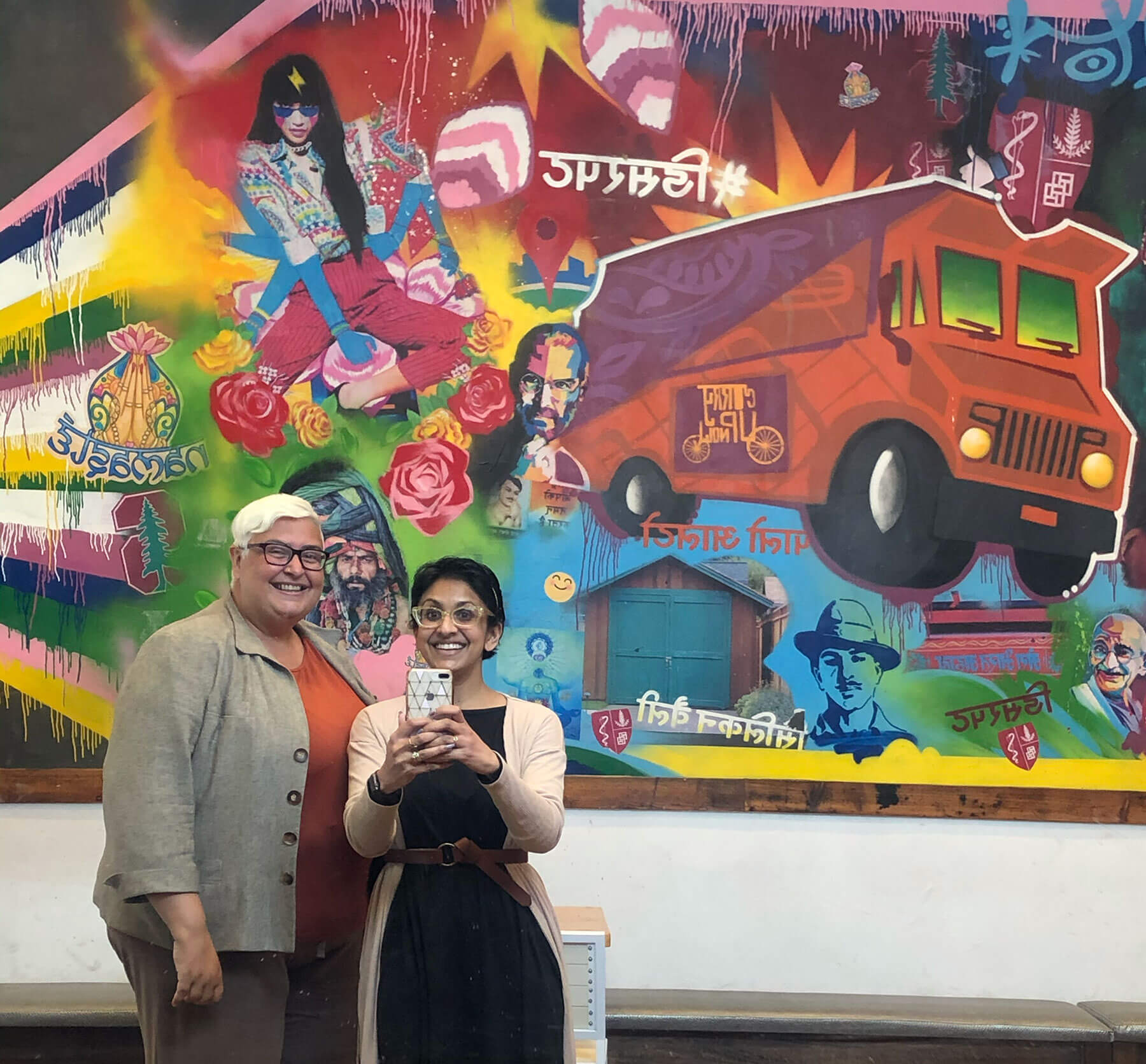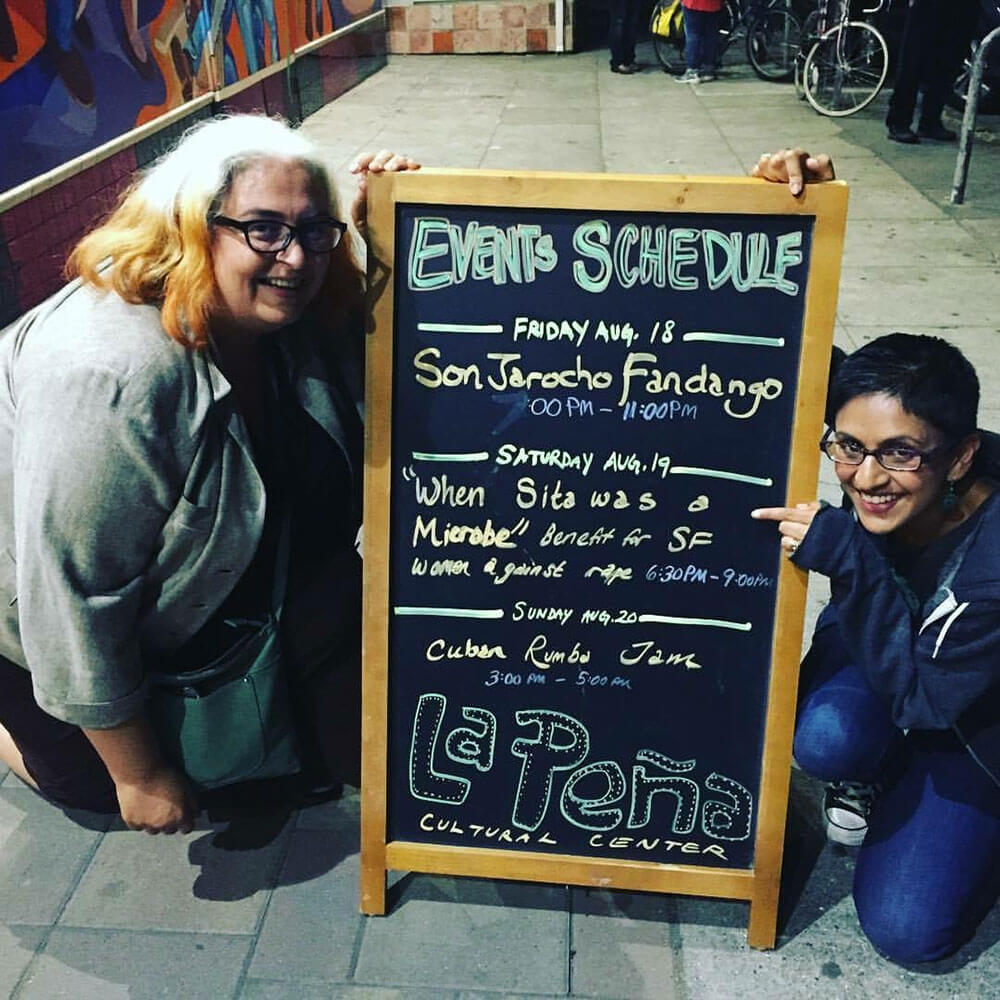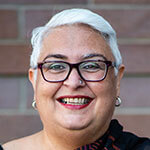
This interview has been edited for length and clarity.
Sandhya: So how long did we hear “OMG there’s another South Asian lady pastor living near you” from everyone we knew before we finally connected? And where did we actually finally connect?
Tuhina: I first knew about you from fellow clergy in the area, who were wondering, “Have you met the other South Asian lady pastor in the area?”
I hadn’t, and knowing you were out there in the world made me feel less alone. Then I found your writing. I found a copy of “Pre-Post-Racial America” at Sagrada Sacred Arts in Oakland, CA. When I read your book, I was straight up fangirling. When I was looking for contributors for the 2016 online Advent devotional, one of our friends in common gave me your name as a potential contributor. Oh, if you could have seen my fingers shake as I typed the email out to you! Then you said yes to contributing! We agreed to meet at a coffee shop founded by the Black Panther Party. What I didn’t tell you was that I had my copy of “Pre-Post-Racial America” in my purse with hopes you would sign it, but I was so nervous that it remains unsigned to this day.
When we did get to share space and time together, what did it feel like, knowing we weren’t the only unicorns in the world?
S: I love that story because it is so adorable since you’re such a powerhouse. I remember I lost a donor to my nonprofit because I participated in that devotional; I know you lost a lot more, and received hate mail and threats in response. I really loved that the project had such a profoundly revelatory Biblical teaching baked into it. The Bible has been sanitized so much that we don’t realize how foul-mouthed the Hebrew Bible prophets really were, because the conditions they were speaking against were so disgusting it evoked incredibly provocative language to get people’s attention.
And so you and your colleague Jason invited us to be just as bold and just as provocative in our speaking out against the sin of police brutality against our Black family, in keeping with the prophetic tradition. (I think I was assigned to write an advent devotion called “Shut the F*** Up”. To remind us to listen to our Black family as we approached the birth of the Christchild.)
As far as getting to know each other, I’m tearing up a little as I note what a gift it is to be with someone who knows the same stories, the same tastes, the same challenges of belonging and not belonging — as women, as Brown women, as Brown women called to parish ministry, with connections to Hinduism that the church is particularly anxious about and yet has helped us connect to family and also the divine. There’s so much there.
How about you, sister-pastor? And also, can you brag about us cooking Indian food for like 100 people so I don’t have to?

T: Getting to cook Indian food with you for a Movement for Black Lives training was one so very fulfilling in more than just one way. It was fulfilling not having to explain to another person what we were cooking. It was fulfilling helping to feed siblings at the training. It was fulfilling to be in a kitchen with a friend, experiencing the familiar smells of one of the places we call home. It was fulfilling to share such food for liberative work. One of the training participants continues to remind me of that meal we prepared, that the work of Black liberation is a work that involves all of us.
Our sisterhood reminds me that I am never alone. That the Holy Spirit was definitely up to something having us be nearby doing ministry and invested in communal care outside the walls of a physical church building. That a multitude of stories can live in so many different ways in a community. Our sisterhood reminds me that love of family can cross oceans, no matter where we may find ourselves.
What are your hopes for people seeking a home in community?
S: I love that question. I think my own journey has been deeply connected to that notion of seeking and also claiming home. I was born in England of a Scottish mother and Indian father, and we moved to Akron, Ohio, when I was a toddler. We had a really beautiful “family of choice” — folks who didn’t quite fit into the world of Akron — and we eventually also connected with a Bengali community. But when I went to high school outside of Chicago, I met South Asian Americans who were at home with alternative identities: hip hop Desis and grunge and punk Desis, who didn’t apologize for being smart or hardworking but also embraced the arts and music and pop culture in ways that rejected the “model minority myth”. And in some ways that was a taste of finding home in community. And in some ways maybe that’s what I hope others get to experience: there are many ways to be who we are culturally, and even religiously, that can be respectful of our origins and still unapologetic about the mix of things that makes us ... us.
A part of me wonders if that’s why Jesus assembled the women and men he did, to show that was actually possible, that it was possible for us to bring our whole selves, not just our curated selves, and be a family around shared faith and values. And I like to imagine you and I are working on creating that with a couple of other sisters of color right now. Any chance you’re willing to share a little bit about that and why you’re willing to play with our little experiment? I’m wondering if it has to do with your own sense of the possibilities of home in community.
T: I cannot help but constantly think, were it not for a community of women, would we know about Jesus’ resurrection today? Being in a community of sisters of color where we are daring to dream a different way to follow Jesus terricites me. It’s terrifying, and thinking of the terror the women must have felt when they encountered the empty tomb in Mark’s Gospel, and exciting because there is something different, and in a way that we and our co-conspiring sisters of color haven’t yet been a community gathered by the Holy Spirit. Scheming and dreaming for ways to embody this new community is something that sustains me in these days; it makes me excited to gather as a people of God to follow Jesus to wherever the Spirit may lead. I’ve been in churches where so many white, cishet men have been groomed for leadership; what makes me want to see our community come to life is that Jesus saw those who specifically weren’t groomed for leadership and told them God’s got them. Thinking about it just makes my bones resonate.
Were it not for the women, where would we be, dear sister?
S: Amen. You know, I’m thinking about all the things we could have complained about as API women navigating the church given our callings. Suspicion about whether we were Christian enough. Suspicion about whether we were Disciples enough or Lutheran enough as we went through the ordination process. Skepticism about our gifts within API churches because we’re women. The boxes people kept trying to put us into that didn’t align with our lived experiences growing up in the South or the Midwest. The ways we felt welcomed, and not, in our parents’ homeland. The ways we were othered, and in your case physically assaulted at a protest in downtown San Francisco when Trump was inaugurated on January 20, 2017, because of who people had decided we were. You were marching with a POC contingent, and because you were a smaller woman of color in that group, that may have made you an easy target, thereby being harmed for who you are.
I love that instead, we’ve let ourselves revel in each other’s gifts. That feels like the heart of the Gospel to me. We found each other because we’re sisters in Christ. We have some shared cultural experiences and we do have shared experiences of marginalization that we are not afraid to talk about.
And yet we’ve talked about the ways we got to be together as we helped a team of folks nourish the religious leaders engaged in the Movement for Black Lives, and we talked about the excitement of finding each other and our relationship growing. We’ve celebrated how special each other is and that we’re exploring, with two other clergywomen of color, the possibility of birthing a church of, for, and by women of color.
I know it’s a hackneyed phrase, but when I think of how, in this very hard world, we get to be in community with each other, I find myself thinking “What can’t God do?” That’s my final thought. Any final thoughts from you, sister pastor?
T: Just so grateful for these words between us, which have been a balm to my weary soul. That this conversation has sustained me and is something that is helping me keep on. I am grateful for our siblinghood in the faith, and how that continues to grow, change, and strengthen our bond. Love you to life, dear one.

Sandhya Jha (she/they) is an equity and anti-oppression consultant with years of experience in the field. Sandhya continues to work part-time at the Oakland Peace Center, a collective of 40 organizations working to create equity, access and dignity as the means of creating peace in Oakland and the Bay Area, which they founded in 2012. An ordained pastor with a masters in publicpolicy, Sandhya is comfortable in the pulpit, on the picket line or hanging out with friends and friends-to-be over a good cup of tea and a good story. You might enjoy Sandhya's newest book, a theologically progressive dailydevotional; learn more about it here.

Rev. Tuhina Verma Rasche (she/her/hers) has a complicated relationship with Jesus. She lives a hyphenated life as a second generation Indian American raised in a devout Hindu household. She is an ordained minister of Word and Sacrament in the ELCA and currently serves as the Digital Campus Pastor at University AME Zion Church in Palo Alto, CA. She has written and spoken extensively on identities within faith spaces and integrating spiritual practices within the self.